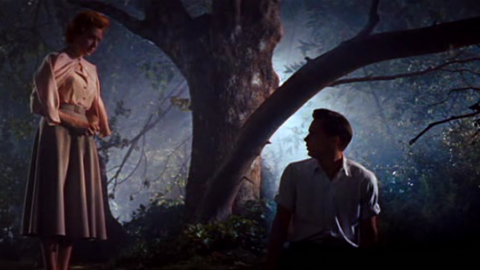Redefining Masculinity: Vincente Minnelli's Tea and Sympathy
Being different from everyone else is hard, but it can be devastating as a teenager. Pressure to conform doesn’t just come from other people, but from within yourself too. There are some teens who can get away with marching to the beat of their own drum. But most people feel like they have a target on their back at that age. When I was growing up, being yourself was a regular slogan for teen sitcoms and movies. But it was easier said than done. I can’t imagine what it must have been like in the 1950s, especially within a hegemonic WASP community. Based on the Robert Anderson play, Vincente Minneli’s Tea and Sympathy follows a young man who does not fit into typical masculinity.
Tom Lee (John Kerr) is a new student at a boys prep school. Unlike the other boys there, John enjoys reading, knows how to sew, and wants to be a folk singer. He gets along better in the company of women than his roughhousing, skirt-chasing classmates. John gets the cruel nickname “sister boy,” and his housemaster Bill Reynolds (Lief Erickson) does little to stop the teasing, believing that Tom needs to learn to be a regular fella. Only Laura Reynolds (Deborah Kerr) is considerate of Tom’s personality and they begin a friendship that could turn into more.
I’ve never read Robert Anderson’s play, nor have I seen a production of it. From what I’ve read, in the play Tom faces direct accusations of being homosexual after getting caught swimming nude with a male professor. Because of the Hays Code censors, all references to homosexuality were cut. Critics have noted that this makes the film rather toothless since there couldn’t be discussion of sexual orientation. In the film, characters dance around queerness, and the film ends with Tom being married (happily or not, we don’t know).
Almost by accident, though, the film makes an even more sophisticated point about sexuality. Tom can be a red-blooded heterosexual male and enjoy feminine-coded pursuits. One does not preclude the other. The patriarchal expectation of performative masculinity leads to Tom being mercilessly humiliated by his classmates, Bill, and especially his own father Herb (Edward Andrews). And yet the societal pressure to “be a man” puts a major strain on Bill and Laura’s loveless marriage, and Herb’s relationship with his son. Both Bill and Herb are so focused on not disappointing other powerful men that they have forgotten their actual family.
Tom wants to be accepted, and his roommate Al (Darryl Hickman) tries to teach him how to walk like a man just to get the other guys off his back. Al then suggests Tom sleep with a local waitress Ellie (Norma Crane). Tom tries to be romantic with her but doesn’t have any affection for her like he does with Laura. Adding to that, Ellie taunts him with the “sister boy” and Tom has an emotional breakdown. For Tom, love has to come with sex, and he is in love with Laura.
Minnelli’s 1962 film Home from the Hill has George Hamilton in a tug of war between his macho father and nagging mother. Out of fear of becoming a weak mama’s boy, he gets help from his father’s employee (George Peppard) on how to be more like his father. In that film as well, rigid masculinity is a prison for women and men. Minnelli also made films about women facing conformity. In the Oscar winning musical Gigi (1958), the eponymous character (Leslie Caron) struggles with training to be a high-end courtesan and succeeds at it. But her client (Leslie Jourdain) falls in love with her as she is, not the trained courtesan. In The Reluctant Debutante (1958), Rex Harrison and Kay Kendall put Sandra Dee through a ridiculous cotillion season to keep up with their friends while ignoring what their daughter wants. In Meet Me in St. Louis (1944), teenagers try to find romance under the confines of respectability as well.
In Tea and Sympathy and these other films, teenagers face what’s expected of them against what they want. Some films, like Tea and Sympathy, show that predicament more intensely. Tom cannot withstand the pressure, and nearly has a breakdown. In the end, Tom finds his peace away from the school. The film asks questions about what it means to be a ‘real man” that still ring true today more than sixty years later.















